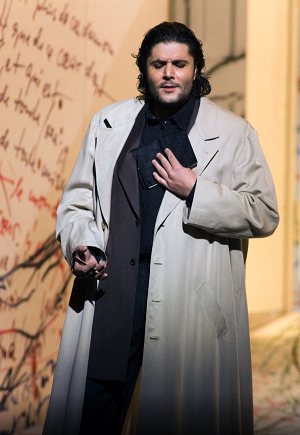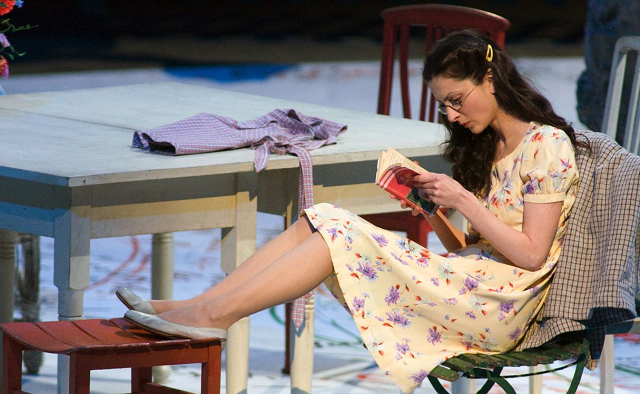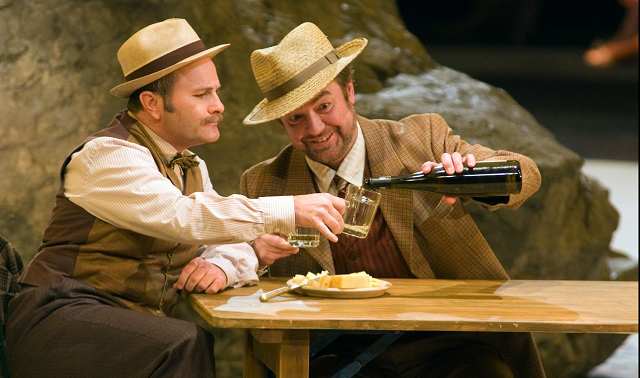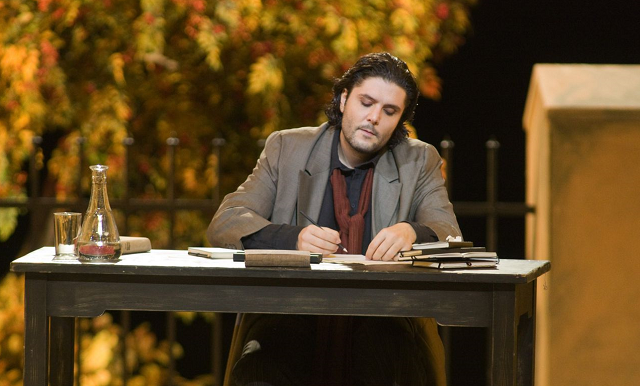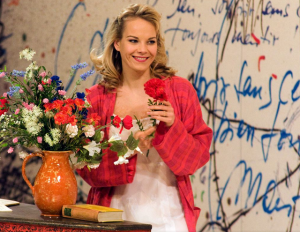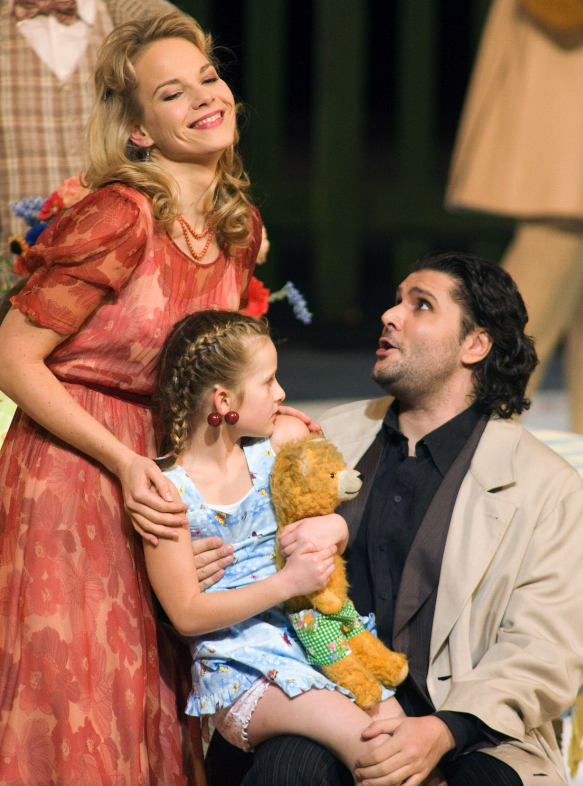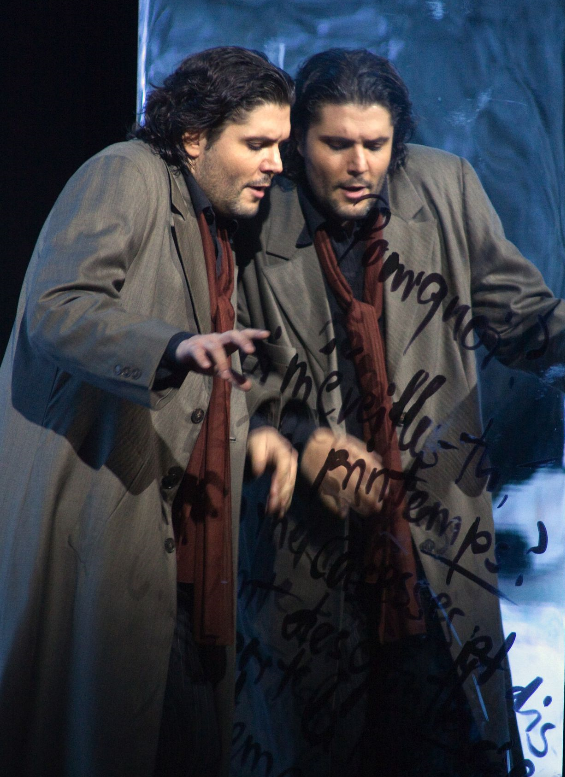By Tiziano T. Dossena —
 Bayerische Staatsoper –
Bayerische Staatsoper –
WERTHER –
Music by Jules Massenet –
Drama lyrique in four acts –
Composer Jules Massenet · Libretto by Edouard Blau, Paul Milliet, Georges Hartmann based on Johann Wolfgang von Goethes novel “Die Leiden des jungen Werthers” –
In French with German surtitles –
October 25, 28, 31, 2015; November 4, 2015 –
Nationaltheater –
Duration est. 3 hours 15 minutes · 1 Interval between 1 Act and 2 Act (est. 07:30 pm – 08:10 pm ) Open ticket sales –
The most famous suicide in world literature as a grand French opera: Werther loves Charlotte, she marries Albert. The passionate, torn Werther despairs and – shoots himself. Goethe’s novel Die Leiden des jungen Werther (The Sorrows of Young Werther) once set off a wave of suicides among young lovers. Jules Massenet’s opera has less of a suicidal effect on its audience – the work established itself as one of the most beautiful at the Grande Opéra. Great duet scenes between the lovesick tenor and his adored Charlotte: pure loveliness, sensuous musical intoxication. Opera that stirs the heart. Emotions that move the soul!
All photographs © Bavarian State Opera
ARTISTIC TEAM
Conductor Asher Fisch
Production, Set, lighting concept and costumes Jürgen Rose
Production Staff Franziska Severin
Lights Michael Bauer
Set Director Ingrid Zellner
Children’s Choir Director Stellario Fagone
CAST
- Rolando Villazón, Matthew Polenzani
- Albert
- Michael Nagy
- Amtmann
- Christoph Stephinger
- Schmidt
- Kevin Conners
- Johann
- Tim Kuypers
- Brühlmann
- Johannes Kammler
- Charlotte
- Angela Brower
- Sophie
- Hanna-Elisabeth Müller
- Käthchen
- Anna Rajah
- Chor
- Kinderchor der Bayerischen Staatsoper
- Bayerisches Staatsorchester
- Children’s chorus of the Bayerische Staatsoper
SYNOPSIS
The scene of the action is Wetzlar
Act One
The magistrate has lived alone with his nine children since his wife’s death. Charlotte, the oldest, runs the household, Sophie, his second-oldest, helps her. Although it is still only the middle of July, the magistrate is rehearsing a Christmas song with his younger children, to the great amusement of his friends, Schmidt and Johann.
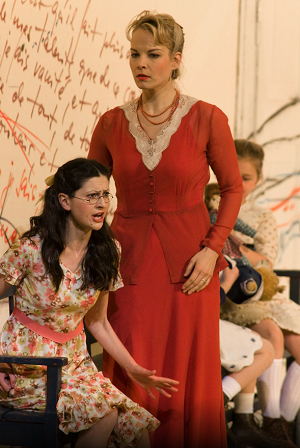 Relatives and neighbours arrive to collect Charlotte and take her with them to a dance.
Relatives and neighbours arrive to collect Charlotte and take her with them to a dance.
Werther, a melancholy dreamer and sensitive poet who loves the country atmosphere, has arrived before them and when he sees how lovingly Charlotte looks after her younger brothers and sisters he falls in love with her and desires nothing more than to become part of this idyllic family. Charlotte asks Sophie to look after their father and the children while she is out and leaves the house with Werther.
While Charlotte and Werther and their friends are at the dance, Albert, Charlotte’s fiancé, returns unexpectedly from a long journey. He learns from Sophie that Charlotte has gone out for the evening but that everyone is looking forward to his approaching marriage to her sister. Albert leaves the house happy and contented.
Werther accompanies Charlotte home and declares his love for her. Charlotte is so overcome by the ardour of his feelings for her that she forgets to mention her engagement to Albert. She feels drawn towards this unusual man. When the magistrate tells her that Albert has returned, Werther learns that Charlotte promised her mother on her deathbed that she would marry Albert.
Act Two
It is autumn. People in the village are preparing for the celebrations in honour of their pastor’s golden wedding, everyone is invited to coffee after the celebration service in church. Albert and Charlotte, who have now been married for three months, are among the guests, as is Werther, who is lost in misery at having lost Charlotte. Albert actually broaches the subject to him, but Werther conceals his feelings and assures the couple of his loyalty to both. When Sophie joins them, Albert uses her happy mood to draw her to Werther’s attention, but Werther refuses Sophie’s invitation to dance and instead seeks a private conversation with Charlotte, reminiscing about their first meeting and renewing his protestations of love.
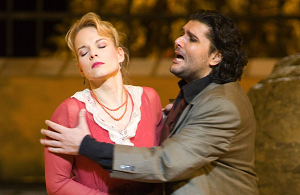 Charlotte points out to him that she now has duties as a married woman and begs Werther to stay away from her for a while. She leaves him, having told him that she does not wish to see him again before Christmas. Werther forces himself to do as she wishes but knows that being at a distance will not help him; he would rather kill himself than do without the love of this woman. He tells Sophie he is going away, never to return. While the guests are celebrating the pastor’s golden wedding, Sophie tells her sister of Werther’s decision and his despair. Albert sees his suspicions about Werther’s love for Charlotte confirmed. Charlotte cannot believe that she will never see Werther again.
Charlotte points out to him that she now has duties as a married woman and begs Werther to stay away from her for a while. She leaves him, having told him that she does not wish to see him again before Christmas. Werther forces himself to do as she wishes but knows that being at a distance will not help him; he would rather kill himself than do without the love of this woman. He tells Sophie he is going away, never to return. While the guests are celebrating the pastor’s golden wedding, Sophie tells her sister of Werther’s decision and his despair. Albert sees his suspicions about Werther’s love for Charlotte confirmed. Charlotte cannot believe that she will never see Werther again.
It is Christmas Eve and Charlotte is preparing to celebrate her first Christmas with Albert. Werther has written her several letters from his exile and she reads them again and again. It becomes clear to her that she returns his love and will never be able to forget him. Sophie comes by unannounced and immediately senses the unrest and sadness in her elder sister. She tries in vain to cheer Charlotte up a little before returning to her father and brothers and sisters. Alone once again, Charlotte breaks down under the vehemence of her innermost feelings.
Werther has not the strength to keep his promise never to see Charlotte again and visits her in her husband’s house. For a short while the two of them remember the happy hours in which they played music together and read the works of the great poets. When Charlotte reminds Werther of the translation he had begun of his favourite poet, Ossian, this becomes Werther’s undoing. Werther works himself up into such a state about the melancholy and despair in the verses that he misinterprets Charlotte’s concern as a declaration of her love and urges her to admit to this openly. Once again, Charlotte’s sense of duty is stronger, she frees herself from Werther’s embrace and rushes out. Werther now finally sees no point in his life any longer and leaves the house.
Albert returns home. He has learned of Werther’s return and finds his wife extremely agitated. As he is about to challenge her, a messenger comes in with a letter from Werther in which he asks Albert to lend him his pistols. Albert forces Charlotte to give the messenger the pistols.
Although she automatically does as she is bid, Charlotte still hopes that she will be able to prevent what she knows is about to happen…
Act Four
Charlotte arrives too late. Werther has already fatally wounded himself with the pistol. He refuses her offer to fetch help, he wants to die in her arms. Now, finally, Charlotte finds the courage to admit to Werther that she loves him. The voices of the children, singing the Christmas song they learnt in the summer, seem to Werther, who is by now hallucinating, to be a sign of heavenly forgiveness. Begging Charlotte to weep for him at the grave he so longs for, Werther dies.
© Bavarian State Opera
NOTES ABOUT THIS PRODUCTION
Jürgen Rose
Thoughts, Image Ideas, Questions…
(from notes written from February 2005 to September 2006)
With (pseudo) realism and a complete historical ambience (be it 18th, 19th or 20th century) and visual milieu descriptions alone (as necessary as they are to tell this story) we will not get any closer to this piece… certainly not right down to the nitty-gritty. Many of these elements would just distract from it. The concentration on the characters (even the supporting parts) would interest me more! From the first moment on, we have to feel Werther’s status as an outsider… a foreigner… in this bourgeois world… the artist people admire because of his talent – yet keep their distance from him!
Perhaps Werther always needs his own dark section of the stage, his specific solitude, his isolation…? (He is restless, questing, self-banishing…) Perhaps we should have a table standing somewhere with his books, his notes, sketches and poems on it?
How can one create an abstract playing area for the mind-sets and conflicts of the protagonists – and still display the bourgeois idyll (Act I), the bourgeois society with its church attendance and anniversary celebration (Act II) and the bourgeois new home of the young couple on Christmas Eve (Act III)?
Everything necessary for an ambience in the initial acts must disappear in the last act! Charlotte removes herself from her world – steps into emptiness…
An ice-cold atmosphere!
The two alone in the emptiness!
How do I make the space for Werther more specific?
Meanwhile I’m back to the white light space darkening into blackness in the background (tent construction with indirect lighting) – combined with a diagonally positioned revolving disk.
What visual means to I need to generate Werther’s unmistakable, intimate situation space exclusively related to his character?
The attraction of Goethe’s letter novel, which must have fascinated Massenet, too – Werther’s manic-depressive tendency, constantly wanting to rephrase, write down, preserve everything keeps forcing itself on me as well, … brings the kaleidoscope of varicolored bits of lettering, chaotic lines and drawings before my eye…
Why not write all over all the walls, the floor and the ceiling, filling them with Werther’s poetic sentences, despairing cries and oaths – scribble the widest variety of sketches all over complete with crossed-out passages – and thus expose the totally individualistic, intimate spiritual landscape of this man (this artist)?
Now Werther’s space, his area in the center is forcing itself on me. Where else can his table stand other than stage center? How can all the bourgeois scenes be arranged? I just happen to see a post card with Caspar David Friedrich’s lonely man on a mountaintop… that’s it!
I search for a meaning, then put it in the model… with Werther’s table and chair on it… there’s nothing more obvious than that! Up there in the “dizzying heights” is the only place Werther’s space can be!
Translation by Donald Arthur
© Bavarian State Opera



